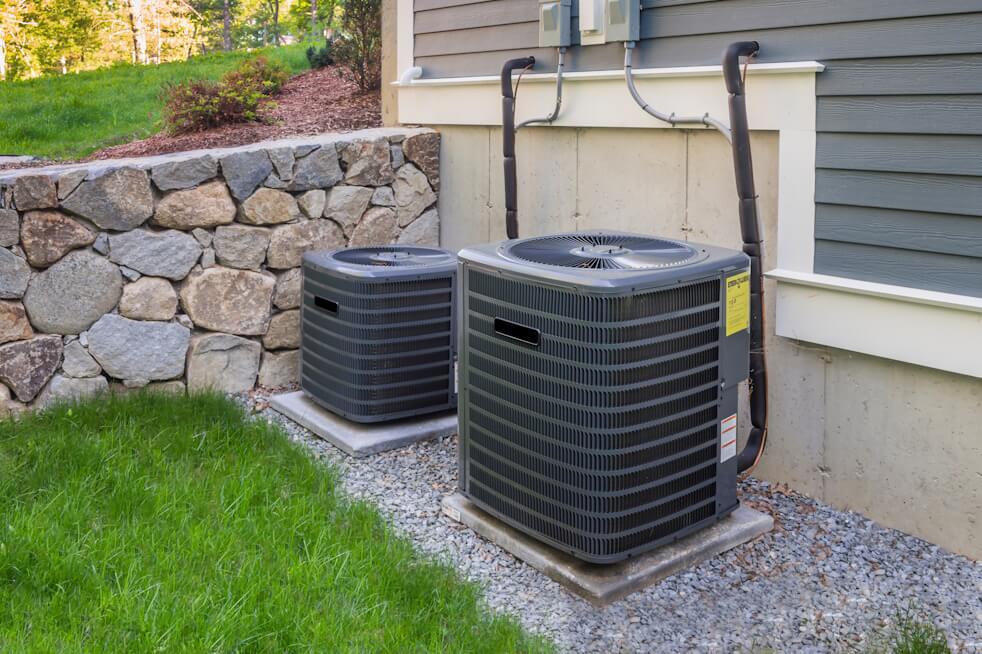For Expert Help, Ask an HVAC Technician Near You
The age of your HVAC unit plays a critical role in its efficiency and overall performance. Just like a car, it experiences wear and tear over the years that impacts how well it runs.
In general, most HVAC equipment lasts between 15 and 25 years. However, this figure can vary widely depending on the type of system you own and how often it’s maintained. Eventually, even the best furnaces, air conditioners, heat pumps, and boilers run their course.
So, how can you figure out exactly how old your system is? Read on for advice from professional HVAC technicians.
The Importance of Knowing Your HVAC System’s Age
Understanding your HVAC unit’s age isn’t just a matter of curiosity; it can help you better control your home’s comfort and safety. With this knowledge, you can anticipate and strategically plan for potential repairs or even a full system replacement by a qualified HVAC technician.
Typically, older systems also have lower energy efficiency. By being aware of just how long your HVAC has been around, you can identify opportunities to reduce your energy usage and prevent unusually high utility bills. A newer system will likely consume less energy, so knowing when to upgrade could mean significant savings in the long run.
If you’re thinking about putting your home on the market, information about how old your HVAC system is could be a substantial selling point. Potential buyers often want to know the age and condition of a home’s heating and cooling equipment, as an older unit can be more of a liability. Having these insights at your fingertips means you can instill confidence in prospects and potentially enhance your home’s value.
HVAC Technicians Recommend Starting with the Manufacturer’s Label
One of the best places to look for your unit’s birthdate is the manufacturer’s label, commonly located on the exterior of your HVAC system. Sometimes you’ll find an actual date listed, but in many cases, the year is encoded into a larger serial number.
Each manufacturer codes their manufacturing dates slightly differently. Here are two of the most common brands and how they include a products’ manufacturing date:
- Trane: Several Trane products have the manufacturing date listed in the top right corner. However, if this isn’t the case, you can look at the serial number. Since 2002, units have featured a serial number with three or four digits at the beginning, representing the year and fiscal week it was made. For example, 91531S41F would indicate that the product was manufactured in April 2009. The 9 represents 2009 and 15 represents the fifteenth week of the year.
- Lennox: Since 1973, Lennox system serial numbers have started with four digits followed by a letter. The first two numbers are the factory or plant code, while the second two specify the year. The letter designates the month the product was manufactured, with A being January, B being February, and so on. A serial number of 1606B13871 would tell you that the unit was made in February 2006. The numerals 06 represent the year 2006, while B indicates February production.
Professional HVAC technicians suggest doing a bit of online research to figure out your specific serial number’s coding convention. Building-Center.org is a great tool for this, allowing you to filter by manufacturer name to determine the age of your unit.
Review Your HVAC System’s Manual or Paperwork
If the manufacturing label is weathered and hard to read, check the manuals and installation documents that accompanied your unit. This often overlooked paperwork can be instrumental in helping you ascertain your HVAC system’s age.
Some HVAC installers will include a sticker on the equipment listing the installation date and the dates of any subsequent maintenance or repairs. Check your unit for this label, too.
If the system was already installed by an HVAC technician when you purchased your home, and you don’t have the information, consider contacting the previous homeowners or your real estate agent. They might be able to share it with you, giving you a better idea of not only how old your equipment is, but also if it has been properly maintained.
Get Help From An HVAC Technician Near You
Should you still find yourself without a clear answer on your system’s age, don’t worry; there’s another valuable resource you can call on: your local HVAC technician. These professionals have years of experience deciphering serial numbers on different equipment. Even if a manufacturing label is faded or damaged, they can often spot details that shed light on when a unit was made.
But the benefits of consulting an HVAC technician don’t stop there. Their comprehensive assessment can also offer insight into your system’s current condition and future maintenance needs, so you can maximize its longevity and efficiency.
Contact an HVAC technician near you to learn more about how old your system is, plus get advice on maintaining your home’s comfort and preparing for future repair and replacement costs.




